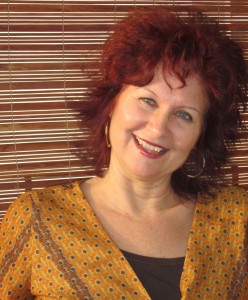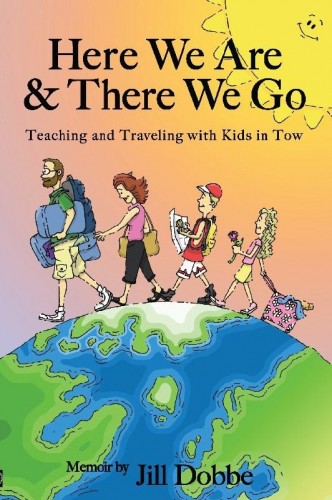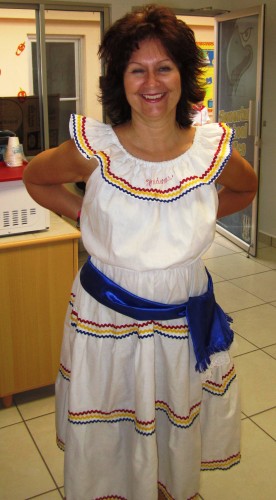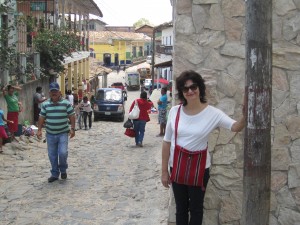My guest this week is Jill Dobbe, whom I met on the We Love Memoirs FB Group.

Jill is an author and overseas educator who continually bops around from country to country and from school to school. The interesting places Jill has seen and the unique people she has met finally prompted her to write it all down in her memoir, Here We Are and There We Go.

During her first 10 years abroad, Jill was accompanied by her husband and her two toddlers. Their adventures took them to Guam, Singapore, Ghana, and Mexico, where they survived typhoon Yuri, were nearly shot by presidential guards, and faced down a pack of African lions. Then, after 10 years of being overseas, Jill’s family returned to the U.S. and experienced their version of reverse culture shock.
Since writing her first memoir about her travels, Jill has lived in Cairo, Egypt, Gurgaon, India, and Tegucigalpa, Honduras, where she presently resides with her husband, Dan, and their Yorkie-Poo, Mickey. When Jill is not shopping in the markets for cultural artifacts or trying to improve her Spanish, she is working as an elementary administrator and writing on the side.
It’s A Small World
“Human beings are more alike than unalike and what is true anywhere is true everywhere.” ~Maya Angelou
Living in a completely different culture can be a rewarding, exciting, and stimulating experience. It can also be difficult, and sometimes downright frustrating. I can tell you this from my own personal experiences as over the past ten years I have resided in three different countries. In total, I have lived in eight (including the U.S.) very different and very unique cultures.

My desire to travel came about in college when I joined two travel groups to Russia and Brazil. As a tourist, I got a small taste of other cultures. However, I wanted to be more than a person who just visits places.
After graduating college with a degree in sociology and elementary education, I began looking for teaching opportunities overseas where my degrees and interest in cultural diversity could both be appeased. Soon after, I married my husband, an educator with the same desires, and together we embarked on the life of international teachers.
As we headed overseas, we knew that we would be giving up our cushy life in the U.S. Oftentimes, we went without electricity or water or both. Many times, we had to contend with ridiculous and dangerous traffic.
Each culture we lived in had its negatives, but they also had many positives, and we always found something to appreciate, learn about, and explore. While living in Singapore, our children spent their days at a local daycare where they learned to sing songs in Mandarin Chinese. In Ghana, West Africa, we were introduced to the local dishes of jollof rice and groundnut soup.
We also learned how important greetings were within the culture and not to greet someone or ask about their family or health, which was considered an insult. As a woman living in the predominately Muslim culture in Cairo, Egypt, I quickly had to learn the dos and don’ts of dressing appropriately so as not to offend anyone. While in Cairo, we also learned a great deal about Egyptian history and artifacts.
There was so much to gain that living there was like having a daily lesson on Egypt’s past.
From Egypt, we moved onto New Delhi, India. It was another new country, culture, and way of life that was completely unfamiliar to us. I fell in love with the saris and the friendly people, but was shocked to learn that the caste system was still practiced, especially in the rural areas of Delhi. After traveling to Dharamsala in Northern India, we were also introduced to the Buddhist beliefs and way of life of the Tibetan people exiled there.
As we lived and worked in various countries, we enjoyed immersing ourselves into each new culture. By acclimating our behaviors and attitudes, we showed the local people that we respected their way of doing things. We ate their local dishes, dressed in their style of clothing, greeting them in their manner, and practiced their local language by speaking it whenever possible. In each of the cultures, we worked hard to blend in and do what we had to do to live like the locals.

Forever keeping an open mind about the differences and similarities between cultures allowed us to enjoy our many travels. By acquiring an unbiased attitude and not judging each culture’s way of doing things, we were able to savor many memorable and rewarding cultural experiences. We often found that the more places we traveled to, the more similarities there were between the different cultures.
First, the importance of family was typical of nearly every culture we lived in, with extended families often living together under one roof. The family bond is an important aspect of each culture and teaches rituals, traditions, and values.
Food is also a very important part of every culture’s identity and celebrations always center on it. Each culture also seems to have a staple dish that it is known for, like tamales in Mexico, hamburgers in the U.S., goulash in Hungary, and spaghetti in Italy.
Lastly, and in most cultures, education is revered and considered the best investment for its population. Education is an effective way to reduce poverty, build a better country, and give people the critical skills and tools that they need to provide for their families.

Living abroad with other cultures has given me a great deal, including lifelong friendships, a deep appreciation for indigenous people, a strong respect and feeling of obligation to help humankind, and gratitude for what I have been able to see in the world.
There are so many things that we can learn from each other if we just turn hate and racist feelings into curiosity, empathy, and gratefulness, especially since our world is becoming smaller and more connected all the time.
###
Want to get in touch with Jill? Here are her links:
Facebook Author Page: www.facebook/jilldobbeauthor
Jill has graciously offered to donate an eBook of Here We Are There We Go to one of our commenters. So, pop us a note below. As always, I love to hear from you.
Interested in reading At Home on the Kazakh Steppe? I hope so.
Just click here if you are outside the USA.
Here for the PAPERBACK and eBook versions.
And here for the LARGE PRINT or eBook versions.
Amazon makes it easy. Or, you can order it from your local independent bookstore.
And, if you have read it, leaving a review on Amazon will help bring me closer to being able to offer a weekend with a discounted price. (just in time for you to fill your family’s Christmas stockings)

Marian Beaman
I once heard a quote to the effect that a mind stretched to new dimensions can never shrink back to its original shape. Travel is one thing that enables that “stretching,” which in your case also benefited your children, Jill. Thank you, Janet, for featuring her on your blog today.
Janet Givens
I love the quote, Marian. Would that more Americans had an opportunity to see more of this wider world.
Jill Dobbe
Hi Marian,
I love the quote and it is so true!
Thanks for your comments.
Jill
Nancy McBride
I am ever grateful for the opportunity my folks gave me to travel and live abroad as a 17 year old, and it whet my appetite for more. It is IMpossible, in my mind, to be parochial once you’ve tasted others’ food, enjoyed their friendship and home life,met their neighbors, spoken in their schools, danced their dances, laughed over human foibles, or inspired each other with ideas and shared values. I’ve never been much of a tourist, but have worked and lived with folks in many areas of the world, since. I’ll never stop, and urge others to try to go outside their self-enforced boundaries, whenever possible. We are now people of the world and tensions are always eased when folks get to know each other one on one! Thanks Janet and Jill! Excellent theme.
Janet Givens
Hi Nancy, Good to see you again. “when folks get ot know each other one on one!” I wonder why that is so often difficult. How quick we can be to lump people together, stereotype, categorize, label, judge. I like to say that’s why God invented coffee — so we could have a cup together and talk. Or tea, or chai, or sake, or … I also love your phrase “self-enforced boundaries.” Ironically, those are often the hardest ones to breach.
“when folks get ot know each other one on one!” I wonder why that is so often difficult. How quick we can be to lump people together, stereotype, categorize, label, judge. I like to say that’s why God invented coffee — so we could have a cup together and talk. Or tea, or chai, or sake, or … I also love your phrase “self-enforced boundaries.” Ironically, those are often the hardest ones to breach.